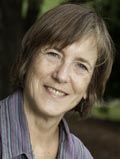Medicine from the heart . . . Suzanne Cashman
On Thursdays, the Daily Voice showcases selected Thursday Morning Memos, reflective essays about clinical experiences written by faculty, alumni, residents and students of the Department of Family Medicine & Community Health and, occasionally, contributors from other departments. Thursday Morning Memos is UMass Medical School’s homegrown version of narrative medicine, in which the authors process their experiences through writing. To learn more, visit: http://www.umassmed.edu/news/articles/2011/personal_stories.aspx.
|
Suzanne Cashman, ScD, professor of family medicine & community health, takes time to notice on her travels how others navigate health care quagmires. The successes of her story are, first, simply noticing how we all might improve, and second, describing how one country has found a way to succeed in their approach to health care.—Hugh Silk, MD |
 |
A System Predicated on Primary Care
Last night I returned from having spent a week in Cuba learning about its health care system. I went as part of a Medical Education Cooperative for Cuba (MEDICC) delegation. As I pull my mind back into the world of my work here at UMMS and re-immerse myself in email messages and listserv updates, certain familiar themes continue to appear. Those themes tend to be about complications and fine points of the health reform bill, continued concern about the shredding of the health care safety net, as well as inequities and inequalities that riddle the system. How does all of this jibe with my recent experience?
First, the context: with a population of about 11 million, Cuba is a very poor and resource-constrained country. Nevertheless, in 2009, it spent about 12 percent of its GDP on health care. While this is a relatively high proportion of GDP for a developing country, that amounted to only $500 per capita (compare this to our approximate $8,000 per capita). Since the revolution in 1959, providing health care for all residents and raising residents’ literacy levels have been two overriding national policies. By all accounts, the country has succeeded. Their successes include a recently reported infant mortality rate equal to that of Canada (4.2 per 1,000 live births), some of the highest vaccination rates and percentages of births attended by skilled health workers in the world, a burgeoning pharmaceutical industry (borne out of necessity, some say, as they can’t get these items through trade with the West) and a literacy rate that is about 98 percent.
Primary care is carried out through family physician/nurse teams who are responsible for the health of some 150 families in a given neighborhood. They concentrate their attention on health promotion, prevention, environmental clean-up, children and the elderly, prenatal care and early detection of infection and chronic diseases. I visited one of these small offices and saw the exam table that must have dated from the 1950s. All records are written—no EHRs here—and are kept by family units. If looking only at the hardware and furnishing of these offices, I suspect we would discount them and their ability to be effective in producing top flight care. But the Cubans have put their limited resources into human capital, building social capital in the process, and they have produced outcomes that surpass ours with our 21st century trappings.
One of the very powerful things I learned about the Cuban health care system is that to ensure that this system is predicated on primary care, all Cuban physicians complete a three-year residency in family medicine before any of them go on to sub-specialize. Can you imagine how that type of systemic change would affect our own system?
We met one evening with several U.S. students who are attending—at no cost to themselves—the Latin American School of Medicine in Havana. They are bright, eager, and thrilled to be learning next to students from around the world. One of them told me that their education is remarkable for its thoroughness—for example, they spend six months just on physical diagnosis, and that repetition is built in so that concepts are learned and retained. It is expected that they will return to the United States after their six years of medical education to complete a residency in an underserved U.S. community. I am hoping that one or two of the young men and women I met will be interested in coming north to Massachusetts, bringing their knowledge of medicine, public health, and a system built on equity to our communities. As we left, they were about to be detailed to respond to a dengue outbreak.
I’m left reflecting on what happens when a country asks the right question: when it begins shaping a health care system by asking what type of system is needed to produce health for all members of a population and then proceeds to construct its system from the premise that health is a human right and that there should—no, that there will—be no discrimination or social exclusion. Of course physicians, like pretty much all Cubans, live modestly. When the country finally is able to trade with any country, when the younger generation begins to feel the pull of consumption, when the older generation that experienced life before and after the revolution dies out, will the principles of equity and commitment to the greater good for all remain paramount? I hope so. In the meantime, I’m also left wondering why—as scientists who are urged to look at and to learn from the “evidence”—we aren’t learning from these Cuban achievements.